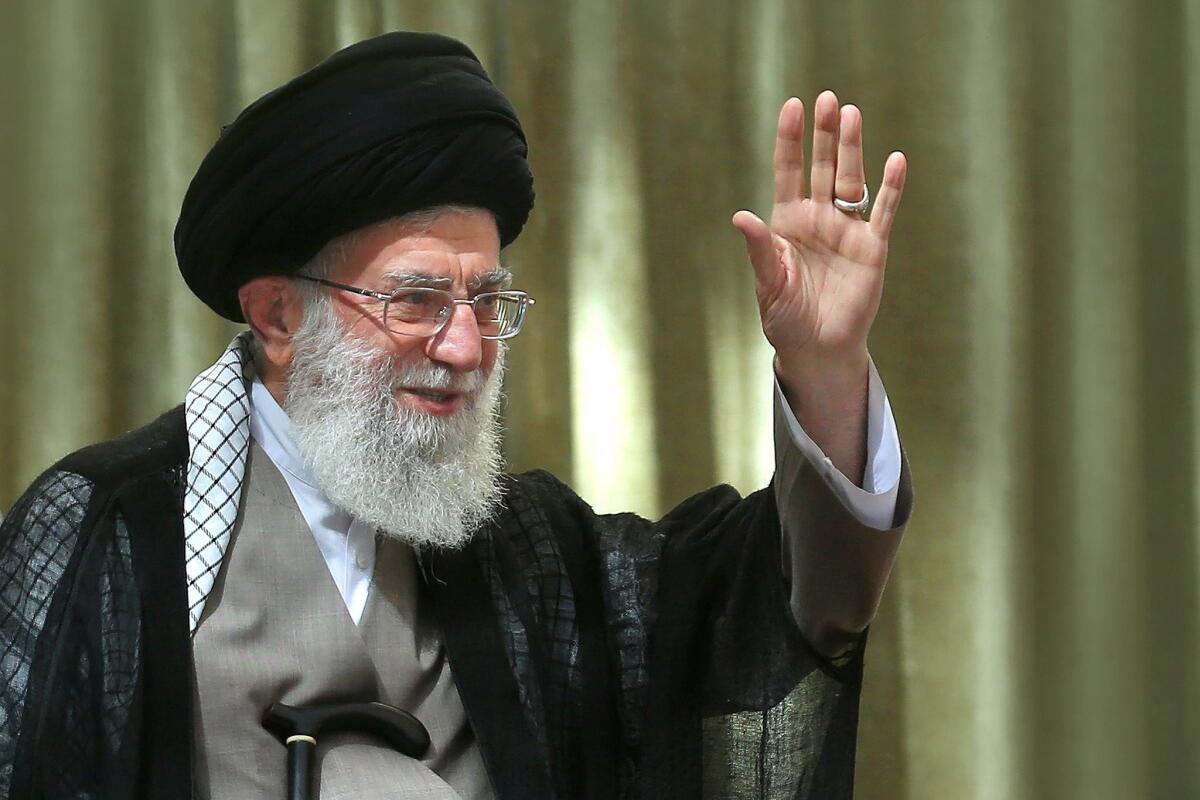Hello, Donald? This is the ayatollah calling

- Share via
WASHINGTON — Iran’s Islamic revolutionaries can be a prickly bunch.
I learned that the hard way in 1980, when as a young reporter I was arrested by Revolutionary Guards in Isfahan for trying to find the 52 Americans who had been taken hostage at the U.S. Embassy the year before.
“You’re a spy,” my interrogator barked. “I’m a journalist,” I replied with as much confidence as I could find. He didn’t seem to think there was a difference.
After four hours, he got a telephone call. “You’re free to go,” he growled at me.
That wasn’t the end of the story. A few days later, a radical group publicly accused me of espionage, named the hotel in Tehran where I was staying and urged “the militant people of Iran” to storm the building. It seemed like a good time to check out. I spent 18 hours hiding in a friend’s apartment, slipped through the airport under a fake name, and fled to London the next day.
I was lucky. The hostages were held for 444 days. More recently, Washington Post reporter Jason Rezaian was imprisoned for 18 months, and Iran is currently holding several Iranian Americans on apparently trumped-up charges.
So I know a little about the distrust and suspicion between the Iranian regime and the United States.
Ever since the 1979 Islamic revolution, leaders in Washington and Tehran have demonized the other side. From time to time, they quietly find common ground in places like Afghanistan (Iran also opposes the Taliban and Al Qaeda). In 2015, Iran agreed to limit its nuclear development program in a landmark deal with the U.S. and five other world powers.
But Iran remains a pariah in Washington, unpopular with both parties, and Trump withdrew from the Iran nuclear deal last year, denouncing Tehran’s “malign” activities across the Middle East.
Hence the headlines when President Trump, at the Group of 7 summit in France, did an about-face and boasted of his friendship with Iranians in New York, declared his desire to make Iran wealthy again, and offered to meet with Iranian President Hassan Rouhani.
“I have a good feeling,” Trump said in Biarritz. “I think he is going to want to meet and get their situation straightened out.”
Rouhani, in Tehran, initially sounded interested.
“If I know that in meeting with somebody the problem of my country would be solved, I wouldn’t hesitate,” he said. “We have to negotiate.”
By Tuesday, Rouhani was having second thoughts.
“First, the U.S. should act by lifting all illegal, unjust and unfair sanctions imposed on Iran,” he said. Otherwise, he added, a meeting would be nothing but “a photo op.”
Actually, a photo op may be exactly what Trump is looking for — much like the three splashy summits he’s held with North Korea’s Kim Jong Un since June 2018.
Those meetings have enabled Trump to claim that he rescued Asia from the brink of war, even though he hasn’t gotten Kim to stop expanding his nuclear arsenal.
Now, presumably, the president hopes to fend off possible war in the Persian Gulf as well, and cast himself as a global peacemaker.
At the moment, oddly, Trump appears more interested in negotiations than Rouhani does, even though Iran’s economy is being battered by U.S. sanctions. But Trump is heading into a reelection campaign, and wants a foreign policy win. Rouhani is a lame duck, although his party faces parliamentary elections in February.
Iran’s reluctance to parley comes from the very top. Its supreme leader, Ayatollah Ali Khamenei, has long excoriated the United States as the chief cause of his nation’s woes. But it may also be a bargaining ploy.
“Lifting the sanctions is Iran’s immediate goal,” Suzanne Maloney, an Iran expert at Washington’s Brookings Institution, told me. “It would be consistent with Iran’s diplomatic strategy to dangle a meeting and then retract it in hopes of driving up the potential payoff.”
“The question is: What’s the price?”
Trump’s sanctions have slashed Iran’s income from oil exports, thrown its economy into recession and driven inflation over 35%. He wants to force Iran to renegotiate the 2015 nuclear accord to get rid of “sunset clauses” that would lift limits on Iran’s uranium enrichment in several years.
The president’s decision to scrap the nuclear pact was unwise. But Trump deserves credit on at least one count: If his enthusiasm for negotiations is real, at least he’s looking for a way to use the sanctions to win diplomatic achievements — not merely to wreck Iran’s economy.
Trump has been more flexible toward Iran than his hard-line lieutenants, especially national security advisor John Bolton and Secretary of State Michael R. Pompeo. Last year, Pompeo issued 12 sweeping demands of the Tehran regime, including changes in its domestic policy. In May, Trump said he had only one goal: “We just don’t want them to have nuclear weapons. That’s all we want.”
In France, Trump expanded that to say he also wants Iran to give up its ballistic missiles, which were not covered in the nuclear deal, but are a worry of Israel, Saudi Arabia and the Gulf states. That may be a much tougher argument to make.
Negotiations with Iran were always going to be difficult to launch. In addition to the heavy weight of history, hardliners in both governments will dig in their heels against concessions.
What’s encouraging is that after several scary near-clashes in the Gulf, both countries say they want to start negotiations, not war. They’re arguably closer to talks than any time since Trump arrived in the White House. But it won’t be as easy as it looked for that magic moment in Biarritz.
More to Read
Get the L.A. Times Politics newsletter
Deeply reported insights into legislation, politics and policy from Sacramento, Washington and beyond. In your inbox twice per week.
You may occasionally receive promotional content from the Los Angeles Times.











